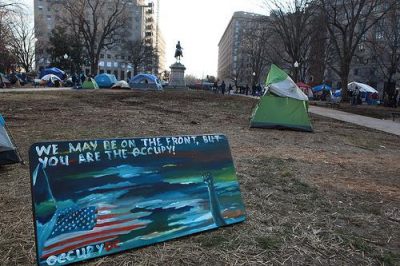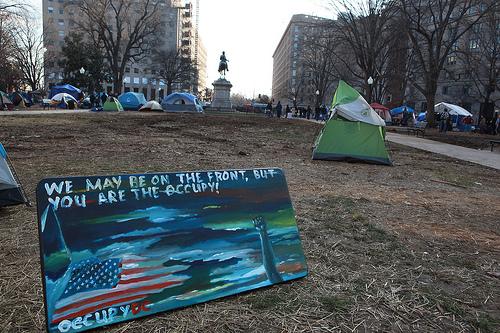
McPherson Square after the raid. Photo by Rick Reinhard.
Some are asking how the Occupy movement will accomplish anything now. I say, it already has. It has already changed our world.
I marched through New York in September of last year on the first day of Occupy Wall Street. I laid down my sleeping bag in the open air in Zuccotti Park on the first intense nights of the occupation. Then, I brought my sleeping bag back to Washington DC, where I live. With some hopeful companions, I began occupying McPherson Square on K Street, home to some of the most corrupt lobbyists in the world. We held meetings in the cool October air, not yet the biting chill of winter. And we went to work building a library, a clinic, a kitchen, a media center — a small village. A second camp quickly emerged in another part of town, within sight of Congress.
I occupied because the rich are too rich, because Wall Street and the corporations control too much, and because all of our governments won’t even begin to seriously address some of the biggest challenges of our time, like climate change. I occupied because, like so many in the 99 percent, I am fed up with the status quo. I occupied because people are suffering all over the country and all over the world, while the power to build a better future is in our hands.
Now, most of Occupy DC has been emptied. Many occupiers were made homeless. Miraculously, the cops spared my humble little tent, with a newly broken pole, but sleeping in the park would now likely get me arrested. (I hadn’t slept at the park recently anyway. Another occupier was staying in my tent.)
Was it all worth it? Yes, and I’ll do it again.
This week, the Senate Budget Committee will hold a hearing about inequality and social mobility, hearing from experts like Sarah Anderson at the Institute for Policy Studies, who has published studies on the CEO-worker pay gap for 18 years. Would the Senate be doing this before Occupy? Probably not.
Mitt Romney is struggling to shed the stigma of being a “one percent candidate,” because his Richie Rich image continues to harm his campaign. Even Newt “Huge Tiffany’s Tab” Gingrich is making jabs at Romney’s wealth. Would this have happened before Occupy? Probably not.
One of President Barack Obama’s favorite stump speeches these days is on making the wealthiest Americans and biggest corporations pay their fair share, which would reduce inequality in this country. Would this have become a favorite presidential refrain before Occupy? Probably not.
A thousand plans are afoot to “re-occupy” this spring. But even if the camps were to end now, the Occupy movement has made millions of Americans think harder about our economic, environmental, and political realities, and that has the potential to change everything. It has created spaces for us to bring a bold new world to life. It has sparked conversations and ideas that no police barricade can hold back. And it has opened dreams that we are all still dreaming — whether we campers are allowed to sleep or not.
Lacy MacAuley wears two hats, which isn’t always easy. She is the media relations manager at the Institute for Policy Studies and a participant in the Occupy movement. www.ips-dc.org
